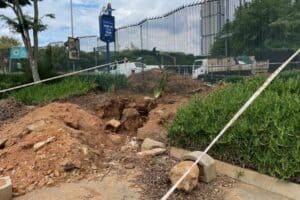The reappointment of Tente Tente as CEO of LHDA has sparked conflict, with concerns over project delays and escalating costs threatening South Africa’s water supply.

Amid tension between South Africa and Lesotho over the reappointment of Tente Tente as CEO of the Lesotho Highlands Development Authority (LHDA), an economist yesterday warned a collapse of the water supply could have significant consequences for the Gauteng economy.
This comes as Johannesburg residents face a weekend of acute water shortages, with two major pump stations around South Africa’s economic hub undergoing maintenance.
Asked for comment on the diplomatic and economic impact of the SA-Lesotho fallout, Water and Sanitation Minister Pemmy Majodina said: “We are not going to respond on this.”
SA-Lesotho fallout
The LHDA, which is responsible for the delivery of water from Lesotho to SA under the 1986 treaty, has handed Tente another term.
Tente will oversee the multibillion-rand construction second phase of the project, including the building of the Polihali Dam and tunnel to funnel water to South Africa – generating hydropower for Lesotho.
ALSO READ: Maintenance of Lesotho Highlands Water Project tunnel ‘on track’ but SA still facing crisis
Fraught with massive corruption, uncovered in 1999 when more than 12 multinational firms and consortiums were found to have bribed the CEO, there are concerns that the project could hit snags before completion.
The Lesotho government reportedly blames Tente for the delays and escalation in cost of the R53 billion plan to build a new dam and tunnel to pipe water to SA.
SA is believed to have cited environmental and political dynamics in Lesotho as at the core of project delays and the cost overruns – avoiding putting the blame on Tente.
Avoiding putting the blame on Tente
University of Johannesburg associate economics professor Peter Baur cautioned that the collapse of the Lesotho Highlands Water Project could have economic ramifications for SA.
“Without the Lesotho Highlands Water Project, a lot more pressure would be put on local water suppliers.
ALSO READ: R10 billion a year spent, but 3 million homes still without running water
“This could lead to incredible restrictions on the agricultural, industrial and residential sectors of the economy,” said Baur.
He said a large amount of the fresh water supply was currently lost “due to existing infrastructural challenges”.
Large amount of fresh water supply lost
“This has already resulted in an increase in water restrictions and additional restrictions could impact pricing.”
The Lesotho Highlands Water Project supplies about 60% of Gauteng’s water.
Support Local Journalism
Add The Citizen as a Preferred Source on Google and follow us on Google News to see more of our trusted reporting in Google News and Top Stories.






